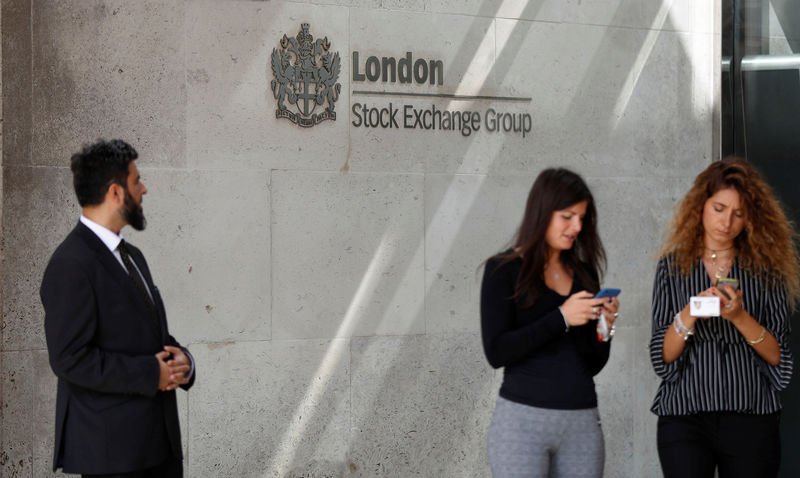By Dhara Ranasinghe
LONDON (Reuters) - Global stock markets fell for a third straight day on Monday, hurt by worries over the escalation of trade disputes between world powers and a deepening sell-off across emerging market currencies.
With U.S. markets closed for Labor Day, trading activity was generally subdued.
European shares were largely flat (STOXX) (GDAXI) (FCHI), although London's blue-chip FTSE rallied almost 1 percent (FTSE) thanks to a weak British pound.
In Asia, MSCI's broadest index of shares outside Japan (MIAPJ0000PUS) and Tokyo's blue-chip Nikkei <.N225> shed about 0.7 percent each.
MSCI's All-Country World Index, (MIWD00000PUS), a gauge of 47 markets, dipped 0.2 percent and the main emerging equity index fell 0.7 percent (MSCIEF), bearing the brunt of global trade fears.
U.S. President Donald Trump said at the weekend there was no need to keep Canada in the North American Free Trade Agreement and warned Congress not to meddle with the trade talks.
Worries about U.S. tensions with China were also kept alive by a report last week that Trump had told aides he was ready to impose tariffs on an additional $200 billion worth of imports from China as soon as a public comment period on the plan ends on Thursday.
That would be a major escalation given the United States has already applied tariffs on $50 billion of exports from China.
"As we head into a new week and month, trade concerns will remain front and center of investors' minds, along with increasing concerns about stability in emerging markets, after the sharp declines seen in Argentina and Turkey’s currency last week," said Michael Hewson, chief market analyst at CMC Markets.
There was also bad news on the economic outlook with surveys showing manufacturing activity took a hit from weak orders in August, a sign firms are feeling the pinch from an intensifying global trade war that could derail global growth.
The surveys of purchasing managers showed mounting pressure on factories across Europe and Asia, with data later expected to show the United States is in the same grip. [nL3N1VP2ZY]
"There are a few existential threats to the world and a broad based trade war is one," said Marie Owens Thomsen, global head of economic research at Indosuez Wealth Management in Geneva.
"We're in a scary parallel to the 1920s and 1930s when there was piecemeal protectionism as we are seeing now."
Across emerging markets, turbulence continued.
Turkey's lira led emerging currency losses after data showed inflation spiked to almost 18 percent in August, while the Indonesian rupiah fell
The Brazilian real weakened more than 1 percent against the U.S. dollar
The lira, at the center of emerging market turmoil in recent weeks, fell 1 percent to 6.62 per dollar
Central bank comments that the inflation outlook showed "significant risks" to price stability and that it would adjust its monetary stance at its upcoming meeting on Sept. 13 in line with this view helped contain the losses.
"This morning's inflation number was very high and the authorities still haven't got a credible strategy to deal with that," said Chris Scicluna, head of economic research at Daiwa Capital Markets.
Turkish Finance Minister Berat Albayrak told Reuters that the central bank was independent of government and it would take all necessary steps to combat inflation.
STERLING TROUBLE
Among major currencies, the British pound stood out as the big underperformer, hurt by comments by the European Union's chief Brexit negotiator, Michel Barnier, that he was "strongly opposed" to British proposals on future trade ties after it leaves the EU.
News that British manufacturers had their weakest month in over two years and export orders suffered a rare fall in August exacerbated sterling's fall.
The currency was last down 0.7 percent at $1.2874
For Reuters Live Markets blog on European and UK stock markets open a news window on Reuters Eikon by pressing F9 and type in 'Live Markets' in the search bar
Global trade concerns supported the U.S. dollar.
The dollar index (DXY), which measures the greenback's value against a basket of other major currencies, was flat at 95.13 after nearing its highest level since Aug. 27.
But gains were muted - safe-haven currencies such as the Swiss franc
In European bond markets, Italian bond yields edged lower (IT10YT=RR) after Fitch Ratings left its credit rating unchanged at BBB on Friday, revising only its outlook to negative.
Oil prices meanwhile rose, supported by concerns that falling Iranian output will tighten markets once U.S. sanctions bite from November, but gains were limited by higher supply from OPEC and the United States.

Brent crude oil (LCOc1) was up 63 cents at $78.27 a barrel. U.S. crude (CLc1) was 26 cents higher at $70.05.